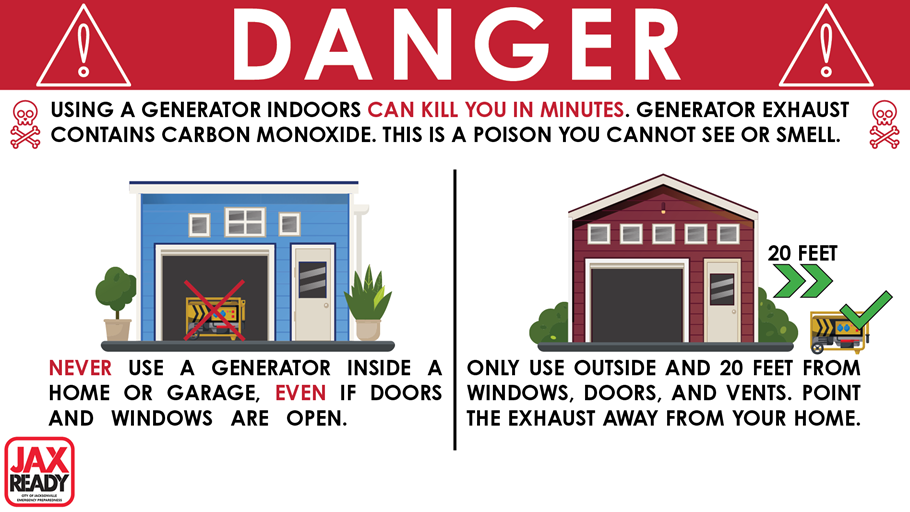Content
Power Outages
Power outages can happen for many reasons, with severe weather being the leading cause. When the power goes out unexpectedly it may impact our whole community and the economy.
Prepare For A Power Outage
Prepare For A Power Outage
- Sign up for the Special Medical Needs registry if you need power for medical equipment.
- Talk to your medical provider about a power outage plan for medical devices powered by electricity and refrigerated medicines. Find out how long medication can be stored at higher temperatures and get specific guidance for any medications that are critical for life.
- Take an inventory of the items you need that rely on electricity.
- Plan for batteries and other alternatives to meet your needs when the power goes out.
- Sign up for ALERTJAX notifications. Monitor weather reports.
- Install carbon monoxide detectors with battery backup in central locations on every level of your home.
- Build an emergency supply kit with nonperishable food and water.
- Use a thermometer in the refrigerator and freezer so that you can know the temperature when the power is restored.
- Throw out food if the temperature is 40 degrees or higher.
- Keep mobile phones and other electric equipment charged and gas tanks full.
During A Power Outage
During A Power Outage
Practice Safety:
.png)
- Use flashlights, not candles to light your home.
- Avoid carbon monoxide poisoning. Generators, camp stoves, or charcoal grills should always be used outdoors and at least 20 feet away from windows. Never use a gas stove top or oven to heat your home.
- Stay away from low-hanging or downed power lines.
- Stay cool in extreme heat: drink plenty of water and avoid strenuous activity.
- Stay warm in cold weather: wear warm clothes.
- Go to a community location with power if heat or cold is extreme.
- Preserve cell phone battery life. Texting saves battery life compared to calling.
- Keep freezers and refrigerators closed. The refrigerator will keep food cold for about four hours. A full freezer will keep the temperature for about 48 hours. Use coolers with ice if necessary
- Turn off or disconnect appliances, equipment, or electronics.
- Turn off or disconnect appliances, equipment, or electronics. Power may return with momentary “surges” or “spikes” that can cause damage.
- Watch out for debris and downed power lines.
- If a traffic light is out, treat the intersection as a four-way stop.
.png)
After A Power Outage
After A Power Outage
- When in doubt, throw it out! Throw away any food that has been exposed to temperatures 40 degrees or higher for two hours or more, or that has an unusual odor, color, or texture.
- Use caution with refrigerated medicine. If a life depends on the refrigerated drugs, consult a doctor or pharmacist and use medicine only until a new supply is available.
Utility Companies Servicing Duval County
- JEA (800) 683-5542 | (904) 665-6000
- Beaches Energy Services (904) 247-6241
- FPL (800) 468-8243